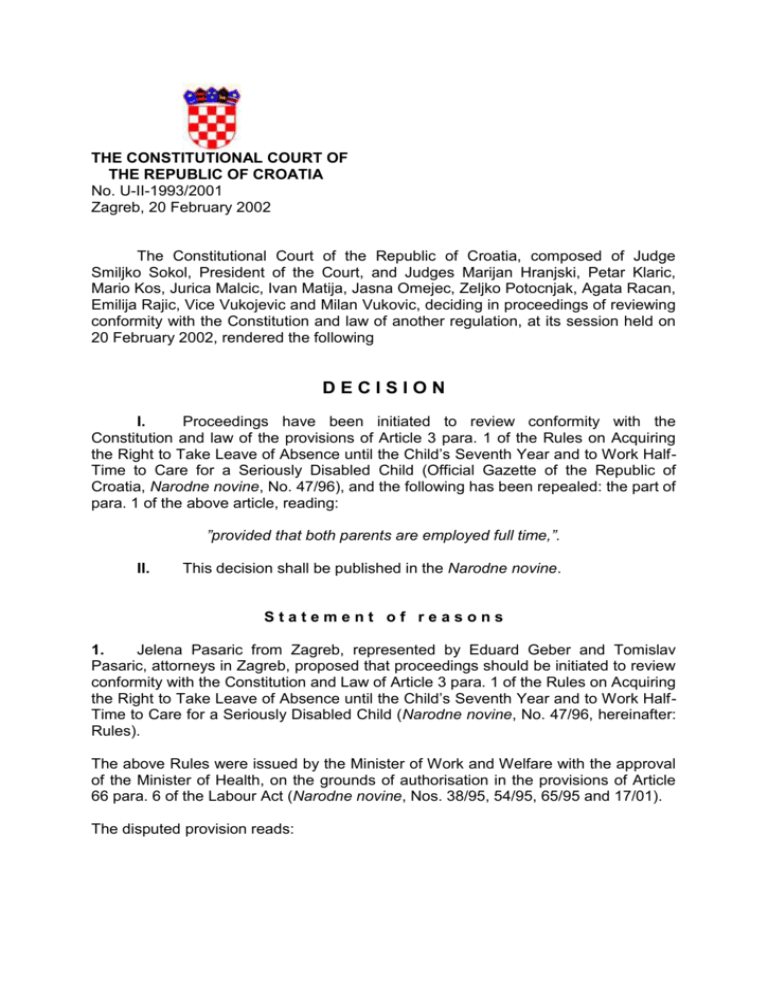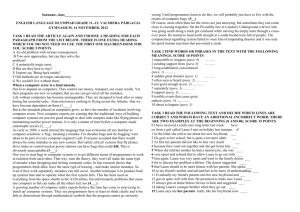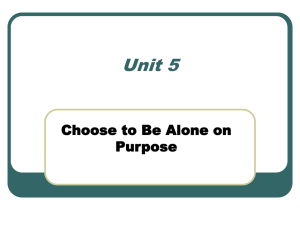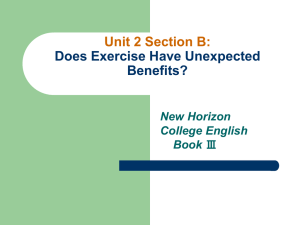decision
advertisement

THE CONSTITUTIONAL COURT OF THE REPUBLIC OF CROATIA No. U-II-1993/2001 Zagreb, 20 February 2002 The Constitutional Court of the Republic of Croatia, composed of Judge Smiljko Sokol, President of the Court, and Judges Marijan Hranjski, Petar Klaric, Mario Kos, Jurica Malcic, Ivan Matija, Jasna Omejec, Zeljko Potocnjak, Agata Racan, Emilija Rajic, Vice Vukojevic and Milan Vukovic, deciding in proceedings of reviewing conformity with the Constitution and law of another regulation, at its session held on 20 February 2002, rendered the following DECISION I. Proceedings have been initiated to review conformity with the Constitution and law of the provisions of Article 3 para. 1 of the Rules on Acquiring the Right to Take Leave of Absence until the Child’s Seventh Year and to Work HalfTime to Care for a Seriously Disabled Child (Official Gazette of the Republic of Croatia, Narodne novine, No. 47/96), and the following has been repealed: the part of para. 1 of the above article, reading: ”provided that both parents are employed full time,”. II. This decision shall be published in the Narodne novine. Statement of reasons 1. Jelena Pasaric from Zagreb, represented by Eduard Geber and Tomislav Pasaric, attorneys in Zagreb, proposed that proceedings should be initiated to review conformity with the Constitution and Law of Article 3 para. 1 of the Rules on Acquiring the Right to Take Leave of Absence until the Child’s Seventh Year and to Work HalfTime to Care for a Seriously Disabled Child (Narodne novine, No. 47/96, hereinafter: Rules). The above Rules were issued by the Minister of Work and Welfare with the approval of the Minister of Health, on the grounds of authorisation in the provisions of Article 66 para. 6 of the Labour Act (Narodne novine, Nos. 38/95, 54/95, 65/95 and 17/01). The disputed provision reads: 2 Article 3 paragraph 1 "The right to take leave of absence until the child’s seventh year or the right to work half-time may be realised only by one parent employed full time, provided that both parents are employed full time, and by a parent who is caring for and nursing a seriously handicapped child alone." 2. In her proposal to initiate proceedings to review conformity with the Constitution and law, the applicant claims that the requirement in the disputed provision of the Rules, whereby one fully-employed parent may take leave of absence until the child’s seventh year to care for a seriously disabled child, provided that the other parent is also fully-employed, is contrary to the reason for and purpose of establishing the above right. In her opinion, the essence of instituting the right to take leave of absence until the child’s seventh year is to care for the seriously disabled child, i.e. a child that is seriously handicapped. In the applicant’s opinion, a handicapped child is incapable of performing activities vital for its life and development independently and without increased care. The need for increased care implies the need for increased time spent with a seriously disabled child, which cannot be provided by self-employed parents the nature of whose work demands full-time work. Furthermore, the applicant emphasises that by refusing to grant the right to special care to children of self-employed parents, whose status differs from employment in the sense of the provisions of the Labour Law, and who often work longer hours than prescribed in this Law, places such children in a very difficult position because they are denied the care they need. In the applicant’s opinion, the lack of special care fundamentally affects the further mental and physical development of handicapped children, and their ability to perform everyday activities. The applicant points out that the Constitution of the Republic of Croatia specially protects the family, mothers, children and disabled persons. Also, in accordance with the Constitution, physically and mentally handicapped children have the right to special care and welfare. This constitutionally-guaranteed special care and welfare cannot be provided if regulations narrow down the circle of people who have the right to take leave of absence to provide the necessary care and welfare. The applicant considers that the disputed provision, in the part that makes it impossible to acquire the right to leave of absence because the other parent is not employed in the sense of the provisions of the Labour Law, is not in conformity with the provisions of Article 14, Article 16 para.1, Article 56 para. 2, Article 57 para. 2, Article 61 para. 1, Article 62, Article 63 para. 3, and Article 64 para 1 of the Constitution, and the provisions of Article 2 and Article 66 para. 1 of the Labour Law. 3. At the present time this Court is also engaged in constitutional-court proceedings initiated in response to the applicant’s constitutional complaint, No. U-III1458/2001. In this constitutional complaint the applicant proposed, on the grounds of Article 59 para. 4 of the Constitutional Act on the Constitutional Court of the Republic of Croatia (Narodne novine, No: 99/99), that the Constitutional Court initiate proceedings, even before the existing legal remedies have been exhausted, against the first-instance decision of the Social Welfare Centre in Zagreb, Centar Office, class: UP/I-555-05-02/01-09, re.no.: 381-114-04/01-03, of 17 May 2001. In the 3 decision the Centre refused in its entirety, as ungrounded, the applicant’s request for the right to take leave of absence until the child’s seventh year, for the care of Duro Pasaric, her child for whom major difficulties in development have been established. With her constitutional complaint the applicant enclosed the opinion of the Labour Market, Labour Relations and Protection at Work Administration of the Ministry of Work and Social Welfare, of 24 May 2002, in connection with the application of the disputed Rules. This opinion states that it has become obvious, during the application of the disputed provisions, that they have to be changed. The opinion also states that the disputed provisions of the Rules demand that funds should be ensured from the budget, and these funds have not been planned in the budget for the current year. In accordance with Article 40 para. 1 of the Constitutional Act on the Constitutional Court of the Republic of Croatia, during Constitutional-Court proceedings the applicant’s proposal was referred for its opinion to the Ministry of Work and Social Welfare on 28 November 2001. The requested answer was not filed with the Court before this decision was rendered. 4. To conclude, the applicant has proposed that proceedings should be initiated to review conformity with the Constitution and law of Article 2 para. 1 of the Rules, in the part in which they prescribe that a requirement for one parent acquiring the right to take leave of absence is that both parents should be employed full time, and to repeal the disputed part of this provision. The proposal is grounded. 5. The constitutional grounds for the legal regulation of family relations are contained in Articles 61, 62, 63 and 64 of the Constitution, which read: Article 61 para. 1 "The family shall enjoy the special protection of the Republic." Article 62 "The Republic shall protect mothers, children and young people, and shall create social, cultural, educational, material and other conditions conducive to the realisation of the right to a decent life." Article 63 "Parents shall have the duty to bring up, support and school their children, and shall have the right and freedom to decide independently on the upbringing of their children. Parents shall be responsible for ensuring the right of their children to a full and harmonious development of their personalities. Physically and mentally handicapped and socially neglected children shall have the right to special care, education and welfare." ... Article 64 para. 1 "Everyone shall have the duty to protect children and helpless persons." 6. These provisions, which this Count considers immediately relevant for reviewing conformity with the Constitution of the disputed provision of the Rules, 4 demand the general constitutional duty of the Republic to especially care for children and young people. The Republic carries out this duty indirectly by creating social, cultural, educational and material conditions for parents to perform their constitutional duties in Article 63 para 1 of the Constitution. It is especially part of creating conditions for the special care and welfare of physically and mentally handicapped children to create a family background in which one of the parents has enough time to provide the necessary special care and welfare. 7. Further elaborating the duty of the Republic to specially care for the life and development of seriously disabled children, the Labour Law in Article 66 para. 1 prescribes: Article 66 para. 1 "One of the parents of a seriously disabled child (a child with serious physical and/or mental handicaps) may acquire the right to take leave of absence to care for the child or the right to work half-time until the end of the child’s seventh year." This provision of the Labour Law grants one of the parents the right to enjoy leave of absence without any restrictions, and at the same time authorises one of the parents to request the right to take leave of absence. This right is not established for the benefit of the parent, it is the right of the seriously disabled child. The seriously disabled child has the right to the care necessary for unhindered life and development. The above provision authorises the parents to request that the competent bodies make available conditions necessary for the special care and welfare of the seriously handicapped child, in the manner and under conditions provided for by law. The purpose of this provision is to provide special care by granting one parent the right to take leave of absence, when it is impossible for the family to provide the proper care in any other way because the other parent has professional duties or is in some other manner prevented from providing the necessary care. 8. In granting the parent of a seriously disabled child the right to take leave of absence, the Labour Law in Article 55 does not prescribe any special conditions or procedure for establishing the requirements necessary for realising this right, but in para. 6 authorises the competent minister to regulate the material. Article 66 para. 6 of the Labour Law reads: Article 66 para. 6 "The Minister of Social Welfare, with the approval of the Minister of Health, will issue the rules prescribing conditions and procedures for acquiring the rights in paras. 1 and 2 of this article and the procedures for calculating and paying the compensation for wages." Giving the competent ministers such broad legal powers to establish conditions for acquiring a certain right does not mean that they have the power to regulate conditions in such a way that they contravene the intent behind the establishment of a certain legal right. The legal intent, which emerges from the elaboration of constitutional principles that grant certain rights to some people, must be respected 5 when such regulations are issued. In the opinion of the Court, the above provision authorises the minister to regulate procedures for acquiring the right to take leave of absence, and to establish the degree of the child’s physical or mental handicap so that it may be granted the right to special care and welfare. The provision does not authorise the competent body to prescribe which of the handicapped child’s parents has the right to submit a request for leave of absence. The right to this choice is vested in the parents. 9. The provisions of Article 2 para. 2 of the disputed Rules establish the degree, i.e. the seriousness, of the child’s disability which shall provide justified reasons for one parent being granted the right to take leave of absence. In accordance with the above provision, a serious handicap is physical or mental damage to the function of organs or the organic systems of such a degree that it precludes the child from independently performing activities appropriate to its chronological age, and makes it dependant on the help of another person in satisfying everyday vital needs. Inability to dress or undress, satisfy basic vital needs (feeding, bladder control, bowel control), move the body (when this is not possible even with the help of orthopaedic aids), use technical equipment or take medication necessary for survival, follow a special diet which, considering the child’s age and ability to move about, must be prepared or administered by parents, and other activities that the child cannot perform without someone’s help, are considered to be serious disorders in the performance of everyday functions. The above provision of the Rules clearly shows that the participation of one parent in the handicapped child’s everyday vital activities, such as dressing and undressing, nutrition, personal hygiene and help in moving about, demands his/her presence in a much greater measure than in the case of bringing up and educating a child without disabilities. 10. Yet, in establishing the conditions under which a parent may acquire the right to take leave of absence, in Article 3 of the Rules the competent minister signed, among other things, that only one parent may acquire this right on condition that both parents are employed full time. By using expressions such as employment and full time, the competent minister clearly indicated that they should be interpreted in accordance with the Labour Law. It therefore follows that one of the parents may acquire the right to take leave of absence as provided for in the Rules only if both the parents are employees, i.e. natural persons employed full time to perform certain work for an employer, in accordance with Article 4 and Article 30 of the Labour Law. A regulation of this kind excludes self-employed parents from the right to request leave of absence on the grounds of the Rules. 11. In the above regulation of requirements for one of the parents of a handicapped child to acquire the right to take leave of absence, the competent minister narrowed down the circle of persons who could realise this right contrary to the legal intent of Article 66 para. 1 of the Labour Law, and contrary to the constitutional principles contained in Article 61 para. 1, Article 62, and Article 63 para. 3 of the Constitution. Acting in this way, the competent minister overstepped his 6 authorisation grounded in Article 17 of the Public Administration System Law (Narodne novine, Nos. 75/93, 48/99 and 15/2000). In accordance with the above provision, ministers issue rules for the implementation of laws when they are specifically empowered to do so, and within the boundaries of the given authorisation. In accordance with the Constitution, the Republic is obliged to ensure special care and welfare for children with physical and/or mental disabilities when these disabilities make the handicapped child seriously dependent on the help and care of other persons. The duty to provide care falls to the parents of the handicapped child in the first place, however, the Republic has the duty to ensure all the necessary conditions to enable the parents to fulfil their duty, which undoubtedly include ensuring the time necessary to provide the care and welfare. The right of one parent to request the right to take leave of absence emerges from the child’s right to special care and welfare, if this special care and welfare demands increased parental presence in the child’s everyday life. In the opinion of this Court, the only criterion for assessing conditions for realising the right to take leave of absence cannot be whether or not both parents are fully-employed. In assessing the conditions for acquiring the right to take leave of absence, account must also be taken that both parents may have work obligations of a nature that may not emerge only from employment, and that they cannot provide sufficient care and welfare to the persons in whose interest the above right was established. Full-time employment cannot be the basic and only condition for realising the right to take leave of absence in cases when both parents are self-employed and thus contribute to the economic strength of the family in which the handicapped child lives, because special care and welfare are also connected with the need to ensure a suitable financial foundation for family life. In the process of establishing conditions for one of the parents to acquire the right to take leave of absence, competent bodies must also consider that since both parents are professionally active they cannot provide sufficient care and welfare for the child whose need for special care has been legally established. 12. In accordance with Article 90 para. 2 of the Constitution, a law whose implementation requires financial funds shall specify the source of such funds. In the case of providing constitutionally established personal care, welfare and protection for a specific group of people, economic conditions in the Republic may not influence the realisation of constitutionally guaranteed rights. 13. In pursuance of all the above, and having established that the repealed part of the provision of Article 3 para. 1 of the Rules on Acquiring the Right to Take Leave of Absence Until the Child’s Seventh Year and to Work Half-Time to Care for a Seriously Disabled Child is not in conformity with the provision of Article 66 para. 1 of the Labour Law, and is not in conformity with the provisions of Article 61 para. 1, Article 62 and Article 63 para. 3 of the Constitution, on the grounds of Article 54 para. 1 of the Constitutional Act on the Constitutional Court of the Republic of Croatia (Narodne novine, No. 99/99), the Court decided as in item I of the dictum. 7 Having established that the disputed provision in its repealed part is not in conformity with the provisions of the Constitution and Labour Law, the Court did not review the conformity of this provision with other provisions of the Constitution, which the applicant indicated in her proposal. The decision in item II of the dictum is grounded on the provisions of Article 28 of the Constitutional Act on the Constitutional Court of the Republic of Croatia. PRESIDENT Smiljko Sokol, LLD, m. p.








